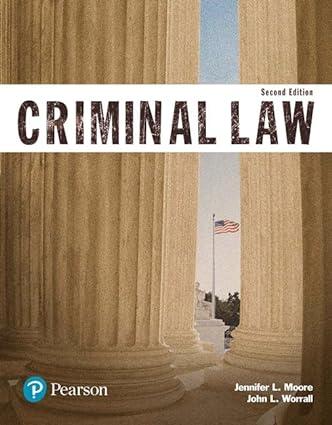The relevant facts are not in dispute. On the afternoon of Wednesday, June 13, 2007, the defendant,
Question:
The relevant facts are not in dispute. On the afternoon of Wednesday, June 13, 2007, the defendant, then a junior at Hanover High School, and two friends, were studying at the Howe Library near the school . . . Upon entering the school, they encountered another group of students who said they intended to steal mathematics exams from the third floor. The defendant and his companions were asked to serve as lookouts during the theft, which they agreed to do. They were instructed to yell something like “did you get your math book?” up to the third floor as a code to alert the thieves if someone was coming.
The defendant and his friends then proceeded to their second floor lockers. The defendant testified that on their way to their lockers they looked around to “confirm or dispel” whether anyone was there. Once the defendant and his friends had retrieved their books, they “were all feeling like this was the wrong thing to do,” and decided to head back down to the first floor to wait for the other group. On their way down the stairs, they encountered some janitors who told them that they ought to leave the school. The defendant and his friends left the school building, but waited in the parking lot for approximately five to ten minutes for the other group. Eventually, the other students exited the school with the stolen examinations and all of the students shared the exam questions.
The next week, someone informed the dean of students that some students had stolen the exams. The police were called, and in connection with their investigation they interviewed the defendant, who admitted his involvement in the theft. He was later charged with criminal liability for conduct of another.
Following his conviction, the defendant appealed to this court . . . RSA 626:8 provides, in relevant part, that an individual is criminally liable for the conduct of another when he acts as an accomplice in the commission of an offense. A person is an accomplice when with the purpose of promoting or facilitating the commission of an offense, he aids or agrees or attempts to aid another person in planning or committing the offense. RSA 626:8 further provides, however, that a person is not an accomplice if he “terminates his complicity prior to the commission of the offense and wholly deprives it of effectiveness in the commission of the offense or gives timely warning to the law enforcement authorities or otherwise makes proper effort to prevent the commission of the offense.” RSA 626:8, VI(c).
The defendant does not dispute that he became an accomplice in the first instance when he agreed to act as a lookout. Accordingly, we are concerned only with whether the defendant’s later acts terminated his liability as an accomplice. We note that the defendant does not contend that he gave timely warning to law enforcement or otherwise made “proper effort” to prevent the offense. Thus, under RSA 626:8, VI (c) the defendant was not an accomplice if: (1) he terminated his complicity in the crime; (2) his termination occurred prior to the commission of the offense; and (3) he wholly deprived his complicity of effectiveness in the commission of the offense.
Questions:
1. Do you think that the defendant was an “accomplice” to the crime? Why or why not?
2. What is the defendant’s legal argument on appeal?
3. Did the defendant effectively “abandon” his criminal plan?
Step by Step Answer:






